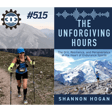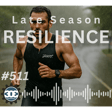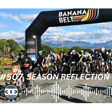
Get Gritty with Off road Triathlon
#496 Get Gritty with Off Road Triathlon
Welcome
Welcome to Episode #496 of the 303 Endurance Podcast. We're your hosts Coaches Rich Soares and April Spilde. Thanks for joining us for another week of news, coaching tips and discussion.
The heat is on and triathlon race season is seriously under way here in the front range. We had a toasty day at IRONMAN Boulder 70.3 last weekend and the heat is on again this weekend for Xterra Lory with temperatures in the mid 90s.
Congratulations to everyone who raced last Saturday at IRONMAN Boulder 70.3!
April, are you ready to blaze the trails around Horsetooth Reservoir?
Hell yeah, Rich and YEE-HAW! I texted you earlier today that this race is going to feel like a high-octane rollar coaster all under your own power. Speaking of which how was you ride around Back Country?
Show Sponsor: UCAN
UCAN created LIVSTEADY as an alternative to sugar based nutrition products. LIVSTEADY was purposefully designed to work with your body, delivering long-lasting energy you can feel. Whether UCAN Energy Powders, Bars or Gels, LIVSTEADY's unique time-release profile allows your body to access energy consistently throughout the day, unlocking your natural ability to finish stronger and recover more quickly!
In Today's Show
-
Announcements and News (Rich)
-
Ask A Coach: Race Report and the Growth Mindset (Rich)
-
Get Gritty: Turning Race Day Nerves into Power! Clear the Mechanism
-
TriDot Workout of the Week: Strength (Rich)
-
Fun Segment: Trail Fail or Win?!
Announcements and News:
Our Announcements are supported by VESPA Power today.
Endurance athletes—what if you could go farther, faster, and feel better doing it? With Vespa Power Endurance Nutrition, you can unlock your body’s natural fat-burning potential and fuel performance without the sugar crash. Vespa helps you tap into steady, clean energy—so you stay strong, focused, and in the zone longer.
Vespa is not fuel, but a metabolic catalyst that shifts your body to use more fat and less glycogen as your fuel source.
Less sugar. Higher performance. Faster recovery.
Home of Vespa Power Products | Optimizing Your Fat Metabolism
Use discount code - 303endurance20
Independence Day Pikes Peak Ride Jul 4, 2025
Join us for an invigorating bike ride from Santa’s Workshop at 7700 feet to the top of Pikes Peak at 14,111. 6800 feet of climbing in 18 miles.
Garmin Course - https://connect.garmin.com/modern/course/369763602
TriDot Pool School July 26-27. https://www.tridotpoolschool.com/component/eventbooking/pool-school/tridot-pool-school-20250726-844-986-401-167-857/94?Itemid=762
Ask A Coach Sponsor: G2G Endurance
Training alone is tough. Training smart? That’s where we come in. Grit2Greatness Endurance + TriDot gives you optimized training, the data, and the support to crush your goals—without burning out. Try it FREE for 2 weeks through our TriDot links below,



















